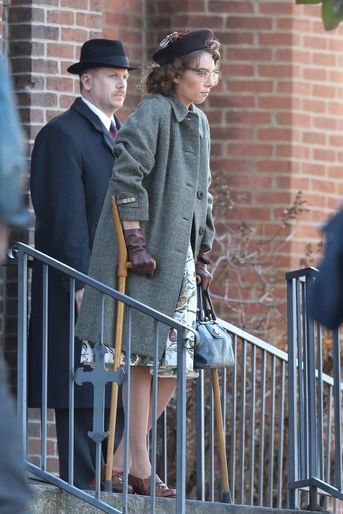In the recently premiered film “Wildcat” at the Telluride Film Festival, directed by Maya Hawke’s father, Ethan Hawke, audiences are taken on a journey through the life of renowned Southern author Flannery O’Connor. The movie, seeking distribution, offers a gripping portrayal of O’Connor’s controversial biography and interweaves scenes from her powerful stories.
One scene in particular captures the essence of O’Connor’s storytelling and serves as a poignant reflection on white privilege. Laura Linney’s character, a smug white woman on a city bus, offers a Black child a penny in an act of condescension. In response, the child’s mother reacts with a smack, leaving the sanctimonious woman in shock. This scene, originally from O’Connor’s 1961 short story “Everything That Rises Must Converge,” highlights the author’s profound understanding of white hypocrisy, a recurring theme in her work.
READ MORE: Michael Fassbender’s Unsettled Assassin Takes Center Stage in David Fincher’s The Killer
Maya Hawke, who takes on multiple roles in the film, including that of Flannery O’Connor herself, notes that O’Connor’s writing delved into the complexities of white hypocrisy, drawing from her personal experiences in the Jim Crow South. “What she knew how to look at was, ‘Oh, I don’t know how to fix this, but I see that there’s something deeply sick about this space that I grew up in and exist in,'” says Maya Hawke.
“Wildcat” skillfully navigates between O’Connor’s real-life biography and dramatized scenes from her stories, including “The Life You Save Might Be Your Own,” “Parker’s Back,” and “Revelation.” While O’Connor is celebrated for her sharp anti-racist parables and explorations of Catholic faith, recent revelations about her racist comments in her personal writings, particularly during her youth, have added complexity to her legacy.
Ethan Hawke, the film’s director, recognizes the challenge of depicting O’Connor’s multifaceted character in a modern biopic but believes it’s essential to confront these aspects of her history. “If you don’t look at it, it doesn’t magically get better,” he remarks, emphasizing the importance of addressing uncomfortable truths. “I came to see [O’Connor] as kind of like if you were studying this beautiful tree. It grew in the Jim Crow South, that is where she was fed and raised. We were studying a tree that is magnificent, but that is where it grew.”
Maya Hawke’s connection to Flannery O’Connor began with her high school English assignments, and she discovered a kindred spirit and a source of profound ideas in the author’s works. Her fascination with O’Connor’s “A Prayer Journal” further solidified her admiration for the writer. The journal revealed O’Connor’s inner struggle between the desire for greatness and the fear of falling short.
Maya’s audition for Julliard included a monologue from “A Prayer Journal,” ultimately leading her to meet with Joe Goodman, the rights holder to O’Connor’s life and works. With the involvement of her father, Ethan, and his producing partner, Ryan, the project expanded into a film that sought to capture O’Connor’s essence.
Ethan Hawke envisioned the film as an opportunity to let O’Connor tell her own story by using her letters, stories, and writings. The unique approach involved double casting, allowing characters to be portrayed through O’Connor’s creativity.
“Wildcat” provides a glimpse into O’Connor’s outsider status in the Jim Crow South due to her Catholic faith, disability from lupus, and Northern education. Despite her unconventional existence, O’Connor approached societal issues with unwavering determination, precise imagination, and a willingness to confront uncomfortable truths.
The film’s producers signed an interim agreement with the Screen Actors Guild (SAG), allowing them to promote the film during the ongoing actors’ strike. Ethan Hawke expresses no concern about potential limitations on the film’s sale, emphasizing his commitment to aligning with SAG’s principles. “Wildcat” is an adventurous and punk film, challenging conventions and offering a unique perspective on Flannery O’Connor’s life and work.
